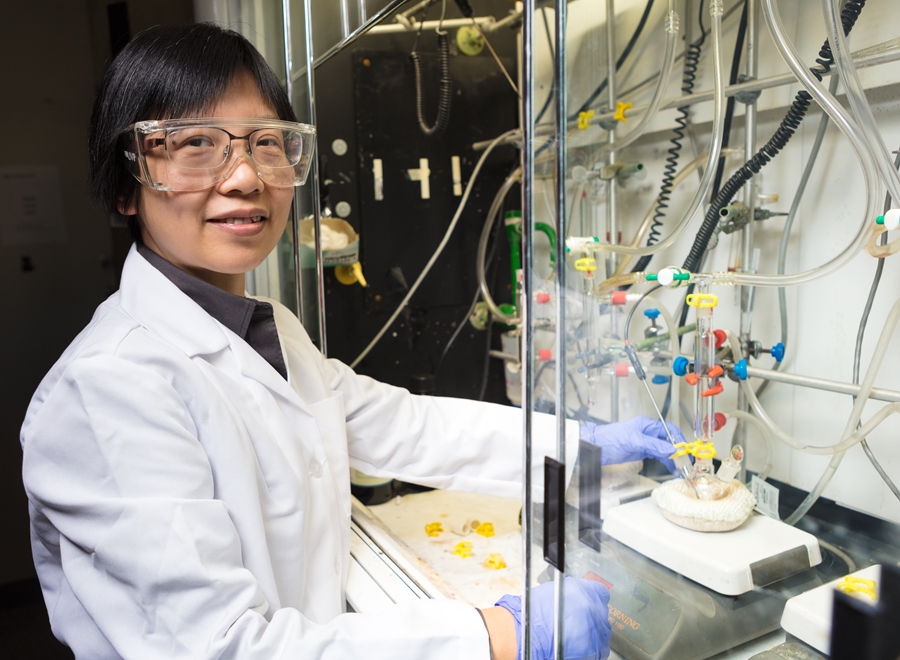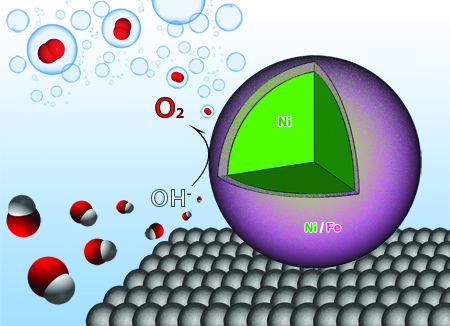Researchers Find Cost-Effective Method for Hydrogen Fuel Production Process

Researchers at the U of A have designed nanoparticles that act as catalysts, making the process of water electrolysis more efficient.
FAYETTEVILLE, Ark. – Nanoparticles composed of nickel and iron have been found to be more effective and efficient than other, more costly materials when used as catalysts in the production of hydrogen fuel through water electrolysis.
The discovery was made by University of Arkansas researchers Jingyi Chen, associate professor of physical chemistry, and Lauren Greenlee, assistant professor of chemical engineering, as well as colleagues from Brookhaven National Lab and Argonne National Lab.
The researchers demonstrated that using nanocatalysts composed of nickel and iron increases the efficiency of water electrolysis, the process of breaking water atoms apart to produce hydrogen and oxygen and combining them with electrons to create hydrogen gas.

Chen and her colleagues discovered that when nanoparticles composed of an iron and nickel shell around a nickel core are applied to the process, they interact with the hydrogen and oxygen atoms to weaken the bonds, increasing the efficiency of the reaction by allowing the generation of oxygen more easily. Nickel and iron are also less expensive than other catalysts, which are made from scarce materials.
This marks a step toward making water electrolysis a more practical and affordable method for producing hydrogen fuel. Current methods of water electrolysis are too energy-intensive to be effective.
Chen, Greenlee and their colleagues recently published their results in the journal Nanoscale.
About the J. William Fulbright College of Arts and Sciences: Fulbright College is the largest and most academically diverse unit on campus with 19 departments and more than 30 academic programs and research centers. The college provides the core curriculum for all University of Arkansas students and is named for J. William Fulbright, former university president and longtime U.S. senator.
About the College of Engineering: The University of Arkansas College of Engineering is the largest engineering program in the state of Arkansas. Over the past decade, the college has experienced unprecedented growth. Undergraduate enrollment has doubled since 2007, and total enrollment in the college is now over 4,000 students. The College of Engineering offers graduate and undergraduate degrees in nine engineering fields, as well as incorporating distance learning and interdisciplinary programs. Faculty in the college conduct research in many key areas, including electronics, energy, biomedical and healthcare engineering, materials science, transportation and logistics.
About the University of Arkansas: The University of Arkansas provides an internationally competitive education for undergraduate and graduate students in more than 200 academic programs. The university contributes new knowledge, economic development, basic and applied research, and creative activity while also providing service to academic and professional disciplines. The Carnegie Foundation classifies the University of Arkansas among only 2.7 percent of universities in America that have the highest level of research activity.
Topics
Contacts
Jingyi Chen, Associate Professor of Chemistry and Biochemistry
J. William Fulbright College of Arts and Sciences
479-575-6203,
chenj@uark.edu
Camilla Shumaker, director of science and research communications
University Relations
479-575-7422,
camillas@uark.edu
Headlines
U of A's Inspirational Chorale Makes Its Carnegie Hall Debut
The U of A's Inspirational Chorale took center stage at Carnegie Hall in March, performing under the direction of professor Jeffrey Murdock to a packed audience at the iconic Stern Auditorium.
The State of Economics With Mervin Jebaraj Set for June 5
U of A economist Mervin Jebaraj will analyze state's economic trends and regional issues in an upcoming talk. Preregistration is required by May 31.
Faculty Demonstrate Dedication to Student Success Through Teaching Credentials
Eight faculty members from across the U of A have earned the prestigious Association of College and University Educators certification in Effective College Teaching.
Artificial Intelligence, Machine Learning Boost Arkansas Animal Science Research
Aranyak Goswami, a bioinformatics specialist, will work with three different departments to boost the research arm of the U of A System Division of Agriculture.
College of Education and Health Professions Doctoral Student Picked for Grosvenor Fellowship
Jessica Culver, a doctoral student in the College of Education and Health Professions Adult and Lifelong Learning program, has been selected as a member of the 2024 Grosvenor Teacher Fellowship.




